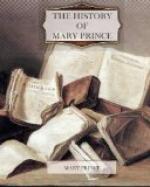“I am, my dear Sir, Yours very truly, JOHN A. WOOD. “20th Oct. 1830.”
“Charles Taylor,
Esq.
_&c. &c. &c._
“I forgot to mention that it was at her own special request that she accompanied me to England—and also that she had a considerable sum of money with her, which she had saved in my service. I knew of L36 to L40, at least, for I had some trouble to recover it from a white man, to whom she had lent it.
“J. A. W.”
Such is Mr. Wood’s justification of his conduct in thus obstinately refusing manumission to the Negro-woman who had escaped from his “house of bondage.”
Let us now endeavour to estimate the validity of the excuses assigned, and the allegations advanced by him, for the information of Governor Sir Patrick Ross, in this deliberate statement of his case.
1. To allow the woman to return home free, would, he affirms “be to reward the worst species of ingratitude.”
He assumes, it seems, the sovereign power of pronouncing a virtual sentence of banishment, for the alleged crime of ingratitude. Is this then a power which any man ought to possess over his fellow-mortal? or which any good man would ever wish to exercise? And, besides, there is no evidence whatever, beyond Mr. Wood’s mere assertion, that Mary Prince owed him or his family the slightest mark of gratitude. Her account of the treatment she received in his service, may be incorrect; but her simple statement is at least supported by minute and feasible details, and, unless rebutted by positive facts, will certainly command credence from impartial minds more readily than his angry accusation, which has something absurd and improbable in its very front. Moreover, is it not absurd to term the assertion of her natural rights by a slave,—even supposing her to have been kindly dealt with by her “owners,” and treated in every respect the reverse of what Mary affirms to have been her treatment by Mr. Wood and his wife,—“the worst species of ingratitude?” This may be West Indian ethics, but it will scarcely be received as sound doctrine in Europe.
2. To permit her return would be “to subject himself to insult whenever she came in his way.”
This is a most extraordinary assertion. Are the laws of Antigua then so favourable to the free blacks, or the colonial police so feebly administered, that there are no sufficient restraints to protect a rich colonist like Mr. Wood,—a man who counts among his familiar friends the Honourable Mr. Byam, and Mr. Taylor the Government Secretary,—from being insulted by a poor Negro-woman? It is preposterous.
3. Her moral character is so bad, that she would prove very troublesome should she come to the colony “without any restraint.”




